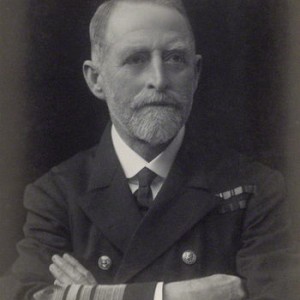
I always used to marvel at the 17 water colour paintings of warships which adorned our walls back home, where ever my parents had lived.They varied from vessels with masts, more akin to the Battle of Trafalgar, right through to one of the first dreadnoughts of the 20th century HMS Cornwallis, later sunk by a German U-boat in WWI.
The glue that linked all the pictures was my great grandfather, Admiral Sir Charles Coke. He had served on all 17 ships during his Naval career and had commissioned the artist F P Taylor to paint them all upon his retirement.
When the Cornwallis went down in the eastern Mediterranean in 1917 (he wasn’t on it), Great Britain still had over 500 naval vessels to fill her void, and counted itself as the biggest maritime power in the world.
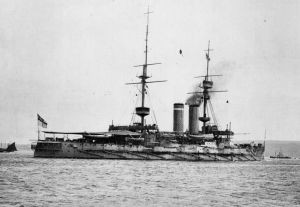
HMS Cornwallis
However fast forward 100 years past the devastation of WWII, the reckless brinksmanship of the cold war and a shrinking empire, would see the Royal Navy enter a period of rusting stagnation.
Although able to drag itself of the canvas and muster a flotilla of 50 warships in the Falklands campaign in 1982, the recent decision to renew Trident and all its ramifications, illustrate how dangerously, the service has been sacrificed for political ends, over the last century.
I grew up living close to GCHQ in Cheltenham. At the height of the cold war in the late seventies, it would have been a prime target for a Soviet ballistic missile, and we all knew it. Although I was forming left wing views and was an ardent punk rocker, I still couldn’t get my head round the CND movement or the notion we’d all be better off Red than dead.
Maybe it was the Navy blood coursing though my veins, but I believed the deterrent effect worked at the time. The USSR had an aura like that of North Korea today. Kim Yong reminded me of Brezhnev, full of bluster, military parades and cunning subterfuge which had you on edge, never to trust
Even the role models like Spectre’s Rosa Klebb or the female Czech runner Kratochvilova

The Terminator
(she looked like The Terminator) didn’t help, so when Elton John became the first western musician to play Moscow in 1979, he might as well have been singing on the moon, for all we knew what was going on behind the iron curtain.

Rosa Klebb
Within two decades though the geo-political landscape of the Eastern bloc would change for ever as Communism fell and countries re-gained their independence after being annexed by the Soviet Union after the war. Many joined the European union, keen to get their slice of the pie and indulge in the riches they had been missing.
The newly formed Russian Federation also assimilated into the capitalist culture, generating gargantuan fortunes for obligarch’s from the countries newly privatised natural resources – much of which came to be invested in off shore bank accounts or property portfolios in the heart of London.
Russia still remains a threat though. Its proxy war in the Ukraine and influence over the Syrian conflict, have given Putin a big bargaining chip in world politics and a further chance to reward his cronies. In many ways their foreign policy, his version of gun boat diplomacy, has gained Russia much, but he’s got to much to loose to let it get to hot by considering any nuclear option.
In many ways post 9/11, Russia faces similar problems to Europe with fundamentalism rife on its Southern border and a shrinking economy. Although its armed forces spending has increased and is now estimated at 3.7% of GDP, its nuclear capability has diminished because of decommissioning and is largely based on defence of the state.
It therefore beggars the question why we should spend an estimated £167 billion on a weapons system, we will never use, because we don’t have anyone to fire it at. Surely the money could be better spent. The argument that Nuclear weapons secures a place on the Security Council is meaningless and it’s time we got off its high horse. There is little peace and security in the world, members have an un-canny way of vetoing others resolutions and the 10 non permanent members, don’t have a nuclear weapon between them.
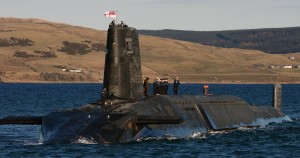
Big white elephant
The other argument often put forward that Nuclear weapons bring us independence is total balderdash. The weapons and technology are leased from the US and Theresa May does not hold the right to incinerate 100k people, only the US President does. The majority of our investment in Trident will go stateside and the building of 4 nuclear submarines is a drop in the ocean considering the US has over 200 similar vessels. It just doesn’t make economic sense or improve our overall security.
A resurgent Russian federation with it’s bellicose tendencies and other threats such as Chinese Imperialism and religious terrorism means our the 2.7% of our GDP spent on the military is a wise investment and in the wake of Donald Trumps comments implying no one is entitled to a special relationship, gives it even more importance, but surely its time we got to spent it in a more proportionate manner.
For too long we’ve been anchored by the constants of Trident. The Chilcott report on the gulf war, lambasted the state of equipment and vehicles for our troops, sending them into a war zone with the bare minimum
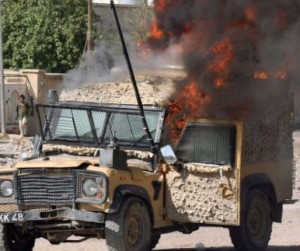
Snatch Land-rover on fire in Iraq
and Admiral Coke would have been firing a broadside from his grave hearing the news that our surface fleet numbers barely 17 ships, (the total number he sailed on).
If that wasn’t bad enough 6 of them – the new Type 26 destroyers, have acute engine problems requiring costly re-fits, leavng the 2 new aircraft carriers currently being built at a great cost, highly vulnerable if it all goes tits up for lack of surface support. I could then hark on about the RAF only having 8 squadrons to help defend the country, but what’s the point. In conventional warfare terms, we’re bouncing along the bottom and we need to do something about it.
Redistributed the Trident money could provide for a substantial fleet of naval vessels of the highest specification, such as HMS Bulwark, making a difference in hot spots, an extra 5 squadrons of Typhoon fighters and the best equipment for our soldiers when called upon. It would also appease the likes of Trump,
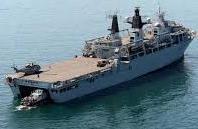
HMS Bulwark
guaranteeing continued US support, providing us added security, more influence in world affairs and more jobs back home.
In an ideal world, the billons the UK spend on defence would go towards social programs to improve our society but sadly it is not that easy. Peppered with political and financial insecurity, proxy wars, and global warming, the world is a dangerous place, requiring careful mapping. A break now from the white elephant that is Trident would give us a better chance to track our course and re-build our armed forces to a level that would negate any need for nuclear arms.






